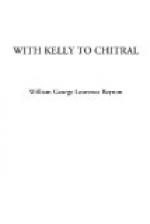There was no difficulty now in getting a man to go to Chitral, so we sent off one with a note, saying we should arrive next day by noon, the 20th April.
The news had spread quickly through camp, and the native officers came round to hear about it. We sent back a post to Mastuj by some Nagar Levies who had just brought in a post, and then had a good discussion as to the causes that led to the raising of the siege.
I don’t know if any of the other officers felt it, but I know, speaking for myself, that with the departure of any uncertainty about our arrival in Chitral in time to save the garrison, a good deal of interest also departed.
I felt inclined to agree with Stewart, that the enemy had given us a just cause for complaint by not playing the game. At any rate, they might have given us a run for our money in front of Chitral, and this seemed to be the general idea throughout the column, consequently our opinion of the Chitrali pluck sank considerably.
We marched at 6 A.M. the next morning punctually, and by noon the advance guard was in the Chitral valley. A halt was ordered to allow the main body to form up, as the guns had had a bad time getting through the Baitali Pari, and had to be unloaded and carried by hand for some distance.
After about two miles we came in sight of the Chitral bridge, which had not been destroyed, and, soon after, of the fort, with the Union Jack still floating on one of the towers.
We crossed the bridge, closed up the column on the other side, the buglers were sent to the front, and we marched on to the fort with as much swagger as we could put on.
We found the garrison in front of the main gate, and were very glad to shake hands again with all our old friends and congratulate them on their splendid defence.
We had a short halt, and then moved on, and took up a position covering the fort, with our front on a nullah and pickets facing south. Our bivouac was in a nice shady garden, with plenty of good water and wood.
When the men had settled down in camp, the officers went back to the fort, where the garrison gave us breakfast, or rather lunch. There was a great deal to hear and tell, and for the first time we began to realise what a touch-and-go time the garrison had been having. There was only one pause in the conversation, and good old Stewart chipped in with “D’ye think, now, there’s any chance of another fight?”
After tiffin, we went round and saw all the sights of interest, and generally interviewed the lions. We saw Harley’s mine, the gun tower, the enemy’s sangars, the hospital, and we did not forget poor Baird’s grave, which was just outside the main gate. Then we went back to camp, and most of us took the opportunity to write home. I also took a photograph when everyone was assembled over the homely cup of tea. The bottles on the table look like whisky, but they only contain treacle made by melting down country goor, the extract of sugar-cane. It was our substitute for butter or jam, luxuries we had not seen for weeks. Whisky was a dream of the past, and rum a scarcity. In fact, there was no difference between what we and the sepoys ate, except in the manner of cooking.




